#but the biggest piece of queer media that unfortunately had an impact on me was fuckin cmbyn
Explore tagged Tumblr posts
Text
Oh shit, Given finished? Like it's done? Damn.
#given#i havent read the manga since *counts fingers* shit 2021 i think#i dunno how i feel man#like this was such a huge series for me#i think the biggest scene for me was the scene where ue asks akihiko if theres something wrong with him and aki just says no#like there was no big 'oh no there isnt! youre still normal! its still fine!' type scene that im sort of sick of#aki just says no. he says its fine and casually comes out as bi and reading that when i was 14 going on 15 really impacted me#like. this may sound like a joke. and it sort of is and is also not#but given was sort of my heartstopper? like that is cliché/memey to say#but its sort of true for me. like i had only seen fuckin junjou romantica and sekaiichi hatsukoi before given#before that it was fucking voltron (yeah this unfortunately counts on my bi journey)#and there were some little in between stuff like carry on and pjo#but the biggest piece of queer media that unfortunately had an impact on me was fuckin cmbyn#no im not kidding#that movie is the reason why i began familiarising myself with the term bisexual#dont ask me why just. just dont#anyways#getting back on topic#given was a big series for me in that way. like it was nice seeing all these queers playing music together#i cant remember why i dropped the series. i just sort of did. there was no whole 'oh im leaving guys bye' moment it was just#'this aint for me anymore. and thats ok. u guys enjoy'#also cant forget that like. if it wasnt for the given anime airing i would not have tumblr. i would not have my dear mutuals#i would not have this blog. quite a few internet milestones wouldnt have happened if i just. stayed on pinterest#some of my first mutuals i made thru the given fandom. this site has helped me in more ways than 1. all cos of a manga#shit this is actually making me emotional damn#okay final say. heard it sort of rubbish near the end but was good anyways. wasnt a fan of the hiiragi mixes (even tho i liked him)#haruki was the best character simply because he was a bi disaster with some functionality who shared the bday as me#everyone else was cool. the anime was good. refuse to watch he movie but one track from i keep replaying#and im grateful for this series#thank you given
6 notes
·
View notes
Note
Hello! Happy June! It's Pride and I have another question (4/30)
Today we are talking about queer representation in media. In 1894 "The Dickson Experimental Sound Film" is released, becoming the first "gay film". It was also known as "The Gay Brothers", it feature two men dancing together and it reportedly "shocked audiences with its subversion of conventional male behaviour". Unfortunately, in 1934 the USA introduced the Hays Code, which, while it didn't explicitly ban queerness, banned queerness in effect. This resulted in three decades of queer-coded villains, such as Joel Cairo in "The Maltese Falcon" (1941) and Jack Favell in "Rebecca" (1940).
The Hays Code was lifted in 1968, and the queer cult classic "The Rocky Horror Picture Show" was released in 1975, and gave a much-needed positive and FUN representation of queer people and queerness. Unfortunately, this was short-lived, as the rising AIDs crisis worsened the stigma around the gay community. This didn't stop everyone though, and in 1985 "Desert Hearts" was released; regarded as the first mainstream lesbian film with a happy ending.
Further on, the first gay kiss on TV in the UK was on "EastEnders" in 1989, "Ellen" became the first American tv show with an openly gay lead in 1997, and other show such as "Buffy the Vampire Slayer" started to add recurring LGBTQ+ characters. An important show in the UK was "Queer as Folk" (1999) which was one of the first shows to depict the queer community as vibrant and alive.
Even further forward, and "Moonlight" (2017) became the first LGBTQ+ film (and the first all-black cast) to win Best Picture at the Oscars. GLAAD publishes an annual report showing how representation is changing. 2005-2006 1.4% of regular characters vs 2020-2021 the figure is at 9.1%. So, there is still a long way to go obviously, especially because media is often the main or only place that young people have an insight into the community at all.
Because of this, I want to ask you for a recommendation: What is a piece of queer media that you think more people should see? (it can be literally anything, big/small, funny/sad, smart/stupid <- just anything you think deserves to be watched!:))
(I'll go first: "Eu Não Quero Voltar Sozinho" (or "I Don't Want to Go Back Alone) is a really really cute Brazillian short film available on Youtube! (if you enjoy it, there is also a full-length film version called "Hoje Eu Quero Voltar Sozinho" (or "The Way He Looks"))
Happy Pride 🌈 🎉
hello!
i haven’t watched a bunch of queer movies that i feel are profound or history making But these are ones that i really enjoyed and cried watching and would recommend.
My Policeman!! biggest one that if you haven’t seen it you should! the way they captured the storytelling in this is phenomenal and definitely had me ugly crying at the end
the first season of Love, Victor is also something that i’d recommend. it’s a tv show so it doesn’t quite fit movies but it pretty close if u watch all of the episodes back to back like i do :D when i first watched this, i had come out to my parents and they didn’t have the best reaction, i found a lot of comfort in the plot. the second and third seasons don’t feel as impactful to me as the first season so i wouldn’t recommend the whole thing but i’ve found myself rewatching the first season often and crying often. (and yes it is a spin off of love simon and they handle it well in my opinion)
0 notes
Text
TMFU, Gaby’s fashion, and some feminist film analysis
Back when I slapped together a reblog post about the men’s fashion in The Man From UNCLE in between physio appointments, which somehow got like way more notes than I ever really expected or even wanted, I didn’t address the fashion of the lead female character, Gaby. It was outside the scope of the OP, and I didn’t feel like I had anything new or interesting to say about Gaby’s fashion, or lack thereof.
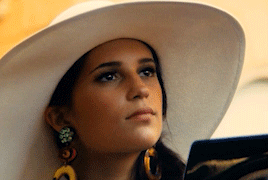
(My beta says those earrings are the ugliest thing ever. I disagree. It’s a wonder we’re still friends)
Anyways, we see only one brief scene of Gaby in her own street clothes, and a slightly longer sequence of her in her work clothes. The rest of the film, she is wearing clothes chosen for her by Illya. Saying “we just don’t have enough info” is a perfectly reasonable approach to this. So this was the other reason I had no intention of making this post.
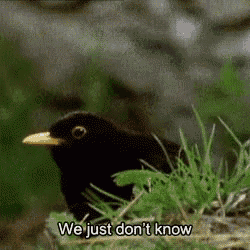
But then people started getting interested. Someone reblogged commenting about Gaby’s fashion, and I discovered that I have very strong opinions about something I’d previously claimed was unknowable, and it made me wonder what was going on in my brain.
Then I talked to some other TMFU friends who all seemed interested in what I assumed was common knowledge/nothing unique. So, they may have been feigning interest out of politeness, but it activated the art history side of my brain, and here we are now!
The boring stuff but please read this
I am not attempting to tell anyone how to interpret this film. I am not even trying to change people’s minds or persuade them to my thinking. All I am doing is sharing my thought process. I wasn’t even going to do this for Gaby until people asked. To this end, please don’t attempt to argue with me about this. I don’t want to argue. I won’t respond to it. If you disagree, then please, just move along.
And I’m going to remind people that I love TMFU. I love this movie so much it hurts. Why am I putting this reminder here? Because I am about to apply some critical analysis to it, and in places this will be cynical, and it will not always look kindly on the film. If you just want to exist in a happy “I love TMFU!” bubble and not hear anything less than 100% positive about the film (which is a totally valid choice, I don’t fault anyone for that), then don’t read. But don’t yell at me for being mean or criticizing the film, because I warned you.
Tldr; or, if I were still being graded for this stuff here’s my thesis statement
When analysing Gaby’s fashion, there exist considerations which don’t apply to the male characters. Namely, she is a woman and the male gaze is a thing. So I am very, very wary about taking at face value any expressions of traditional femininity in the choices made for her outfits, hair, makeup, etc. Therefore, when considering her character, I find it much more useful and informative to give more weight to the aspects of her appearance which do not connote traditional femininity, rather than those that do.
For readers who have studied enough media analysis to follow my thought based on that alone, there’s the thesis statement, y’all can go home (or at least skip to the end where I come to a conclusion). If you’re lost, then read on.
(mobile readers, the cut here might not work, and if so I apologize for what is going to be a very long post. Tumblr’s “keep reading” functionality is inconsistent at best, but I tried)
Context is for kings essential for analysing media in a meaningful way
(Or, some brief background. Stick with me here, we’ll get to the good stuff soon)
So, art doesn’t exist in a vacuum. Attempting to analyze any artwork (in this case a film) while disregarding the culture it was created in and the intentions of the creator is...not going to get you very far. Asking “what is art” is a question that quite frankly exhausts me at this point (looking at you, Duchamp) but the closest I’ve ever come to an answer is that the only thing that separates art from everything else is intent. And intention only exists within cultural context. So yes, intent and context don’t just matter peripherally, they are one of the biggest considerations one needs to make when analyzing works of art. The creator in this case being Guy Ritchie et al, the culture being British/American Popular Cinema in The Year of Somebody’s Lord Two-Thousand-And-Fifteen.
Everyone views and creates (if applicable) art through their own distorted, murky, imperfect lens of personal experience. And one of the most persistent Things in western art is that cishet men create art based on their experience of Being A Dude. This is crucial, because this lens of cishet male perspective literally underpins almost all of western culture including popular culture. And thanks to feminist film theorist Laura Mulvey, we have a name for this.
The male gaze and you
I’m going to quote Wikipedia here, because honestly this intro sentence sums things up rather neatly (with one exception which I will address momentarily).
In feminist theory, the male gaze is the act of depicting women and the world, in the visual arts and literature, from a masculine, heterosexual perspective that presents and represents women as sexual objects for the pleasure of the male viewer.
What does that all mean? That the Viewer and the Artist are both cishet men by default, and any women are Subjects of art. Women are viewed, never viewers. Men take action, women are subjected to actions. Furthermore, women are supposed to be pleasurable to view. By men. Since the Viewer is male by default.
But I would disagree that the pleasure is inherently based on women being sexual objects. That’s honestly a really damn limited read on the whole theory, and it’s one that Wikipedia itself contradicts later in the article. More broadly, cis men also derive other forms of pleasure from the presentation and viewing of female bodies, including aesthetic pleasure (the enjoyment of looking at beautiful things).
The theory of the male gaze is not without limits. As originally theorized, afaik it’s not particularly intersectional. It doesn’t really address queer perspectives or perspectives of POC. However, these issues are something I just can’t address here, unfortunately. And when looking at popular media, I still find the concept of the male gaze, imperfect as it may be, is a helpful means of analysis, so it’s worth having in your toolbox.
Circling back, the easiest way to sum up the male gaze, if you’re still not super clear on what it is, is with a demonstration.
Ever seen a shot like this in a movie?
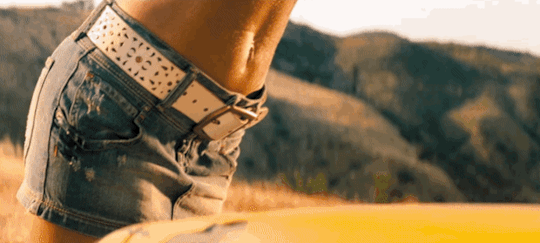
And did you immediately roll your eyes? Feel gross? Congrats, you have just perceived and reacted to the male gaze.
Now we actually get back to TMFU
But the male gaze also shows up in many more subtle, insidious ways than fanservice-y boob shots. For this post, let’s focus on the following considerations, which might help everyone follow my thought process more clearly.
Gaby is a woman
She functions as the love interest of Illya in the script (I am not talking from a shipping perspective. What you ship does not matter for this discussion. I am talking about the narrative function of Gaby in the script as written. Put on your “cishet man” goggles for a moment)
Illya is a man who is attracted to women, specifically Gaby (again, I don’t care if your shipping conflicts with this. I am analyzing the film based on a literal reading of it as if I were a cishet man. Why? Because that’s who made the film. That’s who it’s “for”. I am all for queer readings of film--hell, I ship OT3, I myself have chosen a queer reading for how I interact with it, but I’m not critiquing people’s readings, I’m critiquing the film itself and to do that I have to critique its intentions and cultural context.)
Cishet men are traditionally only allowed to be attracted to women who are conventionally attractive. If they were to be attracted to anyone else it would destroy their fragile senses of self and their heads would explode or something. At least I assume that’s what must happen, based on how terrified they are of it.
Therefore, Gaby must be conventionally attractive, because it is literally required of her or otherwise the whole underpinning of western straight malehood crumbles and then where would we get such a pure, vast source of unadulterated toxic masculinity?
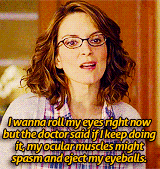
(Yes, this is a very cynical read on things. I’ve studied, like, three centuries worth of this bullshit. I’m tired. Let me be cynical.)
Or, to force myself to be less cynical, Gaby has to be pretty because...nope, this is still going to turn out just as cynical.
But what I will say in favour of this movie is that it gives Gaby and Victoria both a lot of agency and general awesomeness, which is quite unusual in this sort of big-budget action film, and it’s one of the big reasons I love it. I’m not saying that the entire film is sexist. On the contrary, there’s a ton of stuff to celebrate about how it portrays its female characters. But these aspects don’t change the cultural context, and we still have to consider the impacts of the male gaze.
Anyways, point being is that as filtered through the male gaze, Gaby is never given the option to, say, wear no makeup (or the appearance of such, as the guys are afforded, this being cinema where “no makeup” still means makeup) because that would look “ugly”. Instead she needs to have a “baseline of pretty” which is way higher than reality because she is not a real human being with her own agency, she is a character created by a cis male writer/director team in a film directed by a cis man in a genre that caters to cishet men.
Gaby doesn’t exist in a vacuum. She exists battling centuries and centuries worth of sexist convention.
Now then, remembering all of that, let’s actually look at her. There are woefully few good pictures so I’m going to have to piece things together a little. Starting with the coveralls.
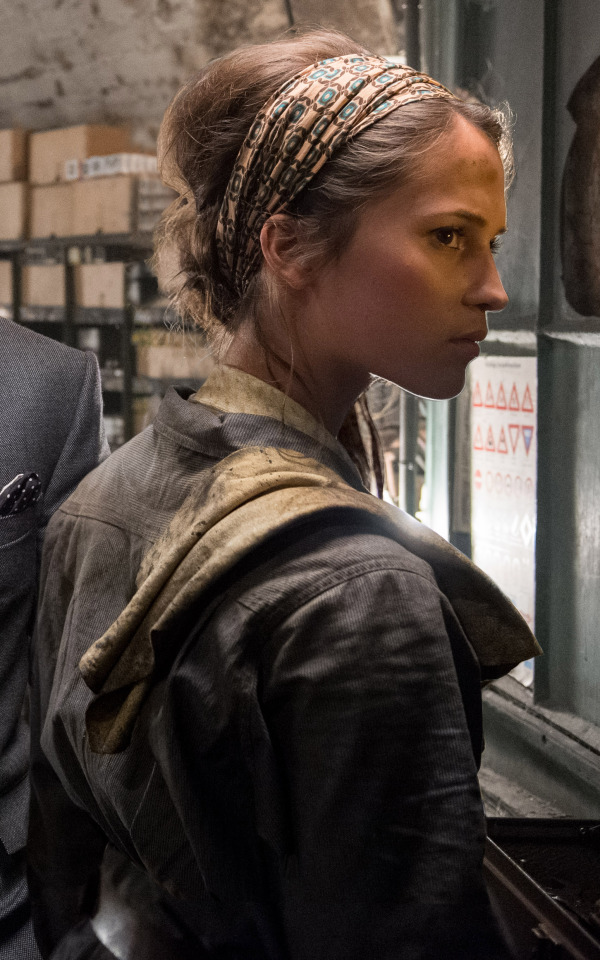
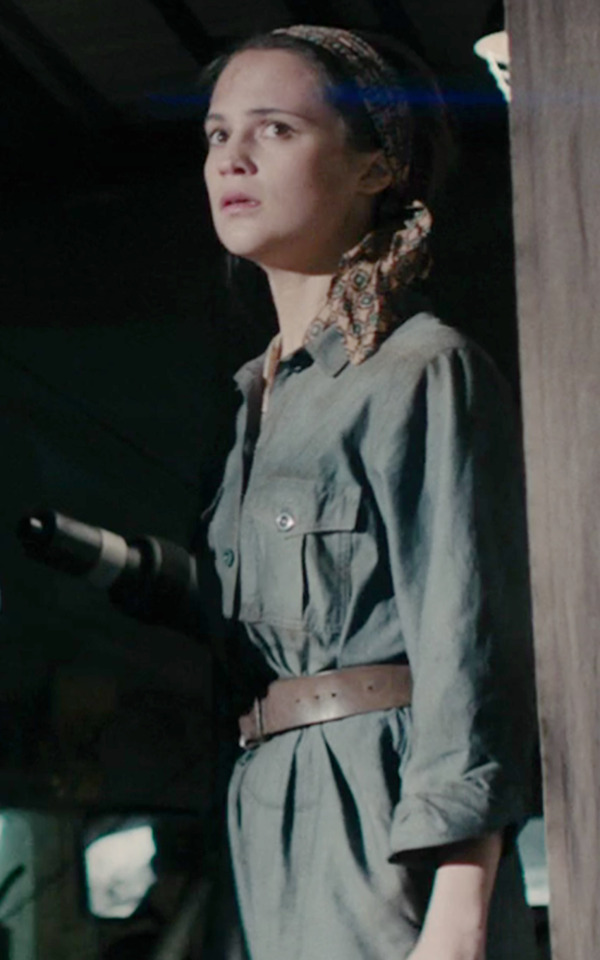
This is a great look, I love it. And I’m going to give Ritchie a lot of credit here because it would’ve been easy to go for a “Michelle Rodriguez in F&F sexy mechanic lady” look. In case I need to provide a visual:
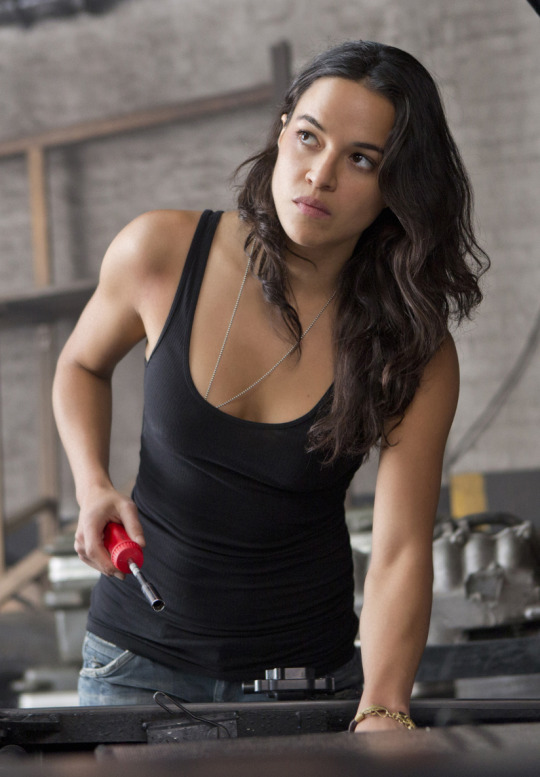
(Repeat above gif about rolling my eyes)
Now, to be clear, I am not making any judgement about the way any real-life women dress. I’m sure there’s plenty of female mechanics who have their hair down and wear tank tops while working. That doesn’t bother me. I don’t care if real life mechanics choose to do their jobs in a string bikini. Or in cosplay of the bee from Bee Movie. I don’t care (and quite frankly it’s none of my business) because they are real people who can make their own decisions. But what I am talking about here is a fictional character who does not have her own agency. I am critiquing how male creators choose to dress their female characters.
So I personally choose to read much more into the unpretty aspects of Gaby’s outfit, because these are not the “obvious” or “easy” things. Obvious and easy are “of course she wears makeup” and “of course her hair looks good” and “of course she doesn’t look like a swamp witch who bathes in mud and spends her days cursing passing men”. Those things don’t challenge or disrupt the assumption that women must look attractive for male consumption.
Gaby’s introduction to us is with her in a pair of grease-stained, baggy coveralls, not wearing any obvious makeup (again, this is cinema, so she is wearing makeup. For cinema the goal posts around “wearing makeup” always need to be moved from where they’d be irl). There’s very little here that screams ‘pretty’. And that is fascinating to me.
I don’t know how deeply Ritchie thought this through when giving final approval to the costume, hair and makeup. But unpretty is not the default here. It’s a choice
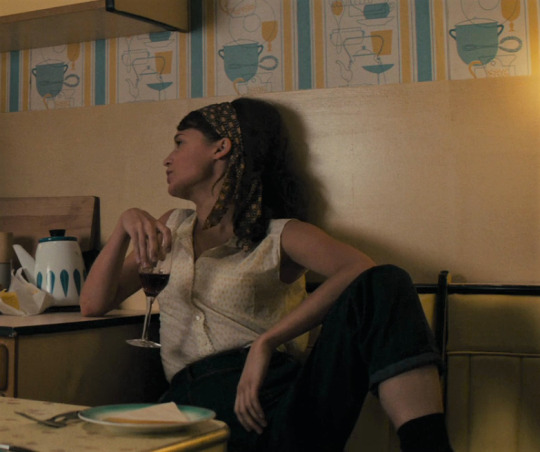
And look at this. This is the stance and dress sense (and socks!) of a woman who does not give a damn about looking good for the male gaze, whether the in-movie gaze of Napoleon, or the implied gaze of the viewer and creator. It’s not ‘pretty’. And this is the only time in the film we see Gaby in her own everyday clothes, as she only escapes East Berlin with the literal clothes on her back.
So how do I think Gaby dresses? I think that for the most part she dresses....like this. Practical. Comfortable. With a few simple touches of things she likes/finds pretty, perhaps, but not with a specific interest in being pretty. She dresses for herself, not for others. And if that isn’t something to aspire to, I don’t know what is.
#gaby teller#tmfu#the man from uncle#meta#costume design#male gaze#fashion#thank you to michael bay for providing me with such a good example of the male gaze
76 notes
·
View notes
Text
A study in representation: Why bisexual John Watson matters.
I started writing an angry rant about sherlock queerbaiting and bisexual representation in television and it turned into a short essay about why John Watson is the bisexual hero we all deserve. Read under the cut if you want.
For many of us the strongest media product that occupied our minds in january was BBC drama Sherlock. In the course of 7 years this masterful piece of television taken over our hearts and minds in what we could call only a expertly crafted mystery. Not really a crime show or a police drama, Sherlock was always focused more on wrapping psychological metaphors into what appears to be “the case of the week”. It took fans years to decode very carefully crafted clues about the relationship between the self-called sociopthic detective and his blogger. Or so we thought we did.
If you take BBC Sherlock, remove the emotions played on the show and the carefull progress of relationship between John Watson and Sherlock Holmes, the only thing that would remain, is a very propostrious and self-indulgent crime show. The creators showed us this in the last episode of the season, where they virtually removed any and all shown ties between Sherlock, his brother and John.
Sure, there were emotionally draining scene between some characters, but they all served to the fact, that the three characters that remained locked together in a room, didn’t show a geniuine emotion towards each other trough the whole episode. This could clearly be seen on moments when Sherlock points a gun to himself and either of the two characters by his side does not react. It’s not as they couldn’t, but if they did, it would ruin the nartative where Sherlock gets hit by a tranquilizer dart before he can kill himself. During the course of the whole episode they sacrificed the trustwortiness of characters and their personality for the sake of the plot.
In the end, fans remained disapointed in the confusing ending of something that could be called a luke-warm homage to every horror movie ever made, rather that episode of Sherlock. The most disapointing was perhaps the idea, that the most hard-working part of the fandom got laughed at for their work. The fans that took their free time to crack the coding and every metaphor in the show all thought they have it all figured out. Even the creators of the show played into our cards with certainly strange but, what remained the most insightful episode in terms of looking into brains of Sherlock Holmes- The Abominable Bride. This special episode, being all part of Sherlock’s imagination, clearly draws few disturbing yet exciting clarifications about what the detective really thinks of his friends and coleagues. Some really toughtfull theories link Sherlock’s and John’s adventure in this episode to the unfortunate marriage of real John Watson to Mary Morstan and Sherlock’s own feeling for his friend. There’s really no other sound explanation for the infamous scene where Holmes and Watson are hiding in the shadows, waiting for the bride to appear, talking about romantic entanglement and impulses.
They even noded to certain conspiracies presumed by the fandom with the secret society that formed in the mids of Victorian London and planned to turn what we know upside down. There was a number of nods to the theories and the conclusions people from the fandom drawn from previous episodes. This whole process left us feel hopeful that we finally cracked the enigma behind the writers intentions.
Even creator Steven Moffat did assure fans that he is coding the show in such manner that in the end we would be able to predict future events in the Sherlock universe. By decoding all previous information we received, there was only one output; BBC Sherlock is a love story in its core. It’s a story of a man drained of his own feeling and sense of self, that is slowly coming to embrace the fact that he is in fact capable of emotions. And the one pulling him out of his shell is no one other than John Watson.
That’s the reason why the core fandom of the show stayed so shook after the last episode. Those of us identifying away from the heterosexual spectrum felt even more betrayed. Because Sherlock was promising us long deserved representation on a show that wasn’t primary understood as romance in the first place. There was potential for normalising a queer relationship in such manner that wouldn’t be disturbing to the show, nor a shockingn factor. Rather it would tie everything together and make sense of so much unexplained acting choices.
For me, it’s not really Sherlock Holmes being gay, that seemed that revolutionary. From the first moment on the show Sherlock was heavily queer coded for the audience. The infamous dinner at Angelo’s, pink phone, bathrobes, or -as Sherlock himself observes- ammount of product in his hair and the way he takes care of his appearance. Nobody would be surprised by this revelation.
The alluring part was John Watson and the group that he could represent. If the finale we all hooed for, would have happened, John Watson would become pioneer in bisexual representation. As a middle-aged white male with military background and mostly average skills John Watson represents the group world often associates with power. His doctor training even gives him a note of credibility, stating him an inteligent middle class that made something of himself. The poster picture of heterosexual man within him and his average cold-headed personality makes him the perfect candidate to break all the rules of this idea how queer people should look like. John Watson is the hero we all deserve by this point in history of television or only in context of recent political climate.
For me, BBC Sherlock had an opportunity to shatter the image we have about bisexuality and how average queer person behaves. They would create a character that already appeals to straight and queer alike and make him the face of normalising lgbtq+ people everywhere. They just had to take that one step further.
But they failed. That sunday night, the group that wanted most to root for this show, stayed dissapointed. We felt cheated, shattered and not enough to be acknowledged by the show we are grown to love. Show, that presented itself on their advertising for this season and all over social media as queer positive, wasn’t brave enough to make the difference, to land that plane and bring us all home. And for what? For getting higher viewing numbers?
So many viewers felt dissapointed and ridiculed in the season finale. It was one of the biggest cases of queerbaiting in the recent history. BBC One even tweeted about Sherlock being in love this season prior to s4 airing. There was countless nods and jokes about how love conquers all and we should just hope and see if it’s our cup of tea. In the end, there was no romantic ending, or not an explicit one. Even thoug we got an image of Sherlock and John living together, if we want to be bolder even being happy together, the ex-wife narative gave it a strange mood of displacement in that moment. The last scene didn’t fit the episode as a whole in the slightest and put off the viewer even more.
The other problematic part can be the fact, that most villains on the show expressed, one way or the other, very dangerous predatory behavior toward a same sex at some points in the show. Though it could be understand as John’s or Sherlock’s own consciousness battling with their sexuality, there’s so many dangerous ways this plays into spreading homophobia and negative stereotypes about queer people. Contrasting this with an openly gay heroes in a loving and normal relationship could have erase such precedens this show has had on portraying queers as dangerous and vile sexual predators. But instead of taking this matter into acciunt, they yet again introduced another predatory queer character that wasn’t even ashamed of confessing to rape.
What they didn’t realise is the impact. Not only the one they could have if they made our wishes true, but the one they made on their viewers. Not only they portrayed queer people in unnaceptable light to straight following of the show, but they send a message to young queers everywhere watching and hopping to see themselves on the screen. And the young LGBTQ+ community asked themselves: Is this really us?
When I was young, I didn’t have any tv show or a book that would showed me it’s ok to be what I was. It took me a long time to realise that the feeling I developed for some girls around me was actually attraction and not just wishfull thinking to be them. It started with young Emma Watson in Harry Potter movies and I dismised it because I already knew I liked boys, so there wasn’t more to it, right?
It was the hit series Glee that helped me made peace with my struggling sexuality. I simply wasn’t straight or gay, I was bisexual. And since that moment I kept searching for that one character that would make me proud, that could put a face to my sexuality and maybe show some basic explanation I could point at and say “he’s like me, that’s how I feel”. I desperately wanted that representation, that magical piece of storytelling that I could show to my family and friends and make them understand. Most character I came across were very problematic in clearly defining their sexuality. There were either gay or straight and there wasn’t any middle ground allowed to land me as a person that discovered she doesn’t want to put herself in either cathegory. If I found a character that could cross into that middle ground, there was always some problem. It was often them being a butt of a joke, problematic relationship with one of the sexes, or even really weirdly framed relationships that weren’t healthy. Or simply they were defined as gay or straight depending on the relationship they ended in on the show.
John Watson was my white whale among the sea of character I couldn’t really embrace as representation for me. He was a mediocre, normal man with positively crafted personality. He wasn’t the shining star of the show, Sherlock always was. He was the friend that probed usefull to have, loyal to the last bit, caring for people around him, in an estabilished relationship with a woman and yet portrayed trough the show as romantic interest of a man. John Watson was the opportunity to show that ones bisexuality doesn’t get erased the moment he enter a monogamous relationship with either sexes. He could also diminish the popular belief that bisexuals are really inconstant and fickle people, often frivolously changing partners. There’s so much stereotypes we believe queer people to be that John Watson simply isn’t. He was everything I ever searched for in merits of breaking the stereotype and represent what being bisecual really means to me. Just being as everybody else.
Representation matters. It might not matter to the fandom, that will always view the story of Sherlock Holmes and John Watson as a tale of untold love, but it matters how our views are presented to the world. The world generally sees but does not observe. Showing an explicit romantic entanglement between these two characters would make the world open their eyes to the possibility that queer relationships are just relationship after all. Portraying two of the most famous characters in this light would be a huge step for queer portrayal in the media.
It pains me to think that bisexual representation lost such a valuable opportunity. This chance to show queer love in show that has such a massive following with both leads played by international stars, was one of a lifetime. And though I haven’t really given up the hope there could be something more still in the horizont, The Lost Specia if you will, that would tie all the lose ends of this series and give us what we as a community deserve, my hope is slowly fading. I will wait untill next Sunday and then I will put my tinfoil hat to rest and resume my search for the white whale elsewhere.
Dear Steven and Mark, this is a plea to you, don’t let us down.
Sincerely,
Your queer fandom.
7 notes
·
View notes